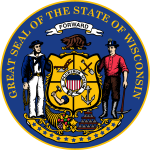| ||||||||||||||||||||||||||
| ||||||||||||||||||||||||||
 County Results
| ||||||||||||||||||||||||||
| ||||||||||||||||||||||||||
| Elections in Wisconsin |
|---|
 |
The 1932 United States presidential election in Wisconsin was held on November 8, 1932 as part of the 1932 United States presidential election. State voters chose 12 electors to the Electoral College, who voted for president and vice president.
Wisconsin had since the decline of the Populist movement been substantially a one-party state dominated by the Republican Party.[1] The Democratic Party became entirely uncompetitive outside certain German Catholic counties adjoining Lake Michigan as the upper classes, along with the majority of workers who followed them, completely fled from William Jennings Bryan's agrarian and free silver sympathies.[2] As Democratic strength weakened severely after 1894 – although the state did develop a strong Socialist Party to provide opposition to the GOP – Wisconsin developed the direct Republican primary in 1903 and this ultimately created competition between the "League" under Robert M. La Follette, and the conservative "Regular" faction.[3]
The beginning of the 1910s would see a minor Democratic revival as many La Follette progressives endorsed Woodrow Wilson,[4] but this flirtation would not be long-lasting as Wilson's "Anglophile" foreign policies were severely opposed by Wisconsin's largely German- and Scandinavian-American populace.[5] Subsequent federal elections saw the Midwest desert the Democratic Party even more completely due to supposed preferential treatment of Southern farmers,[6] and in Wisconsin there were never more than three Democrats in the state legislature (and none in the State Senate) between 1921 and 1929.
The Great Depression, apart from providing a revitalized Socialist Party and small Democratic gains – did not affect the state's politics, which continued to be dominated by the La Follette family, substantially. Nonetheless, given that that family had never endorsed incumbent GOP President Herbert Hoover, the national Republican Party was pleased when a conservative, Walter J. Kohler Sr., won the gubernatorial nomination.[7]
Interviews at the beginning of October said that with the aid of La Follette forces Roosevelt would carry the state,[8] and a poll a week into that month had Democratic nominee and New York Governor Franklin D. Roosevelt ahead of incumbent President Hoover by more than two-to-one.[9] When the Progressive leader Robert M. La Follette, Jr. announced his support for Roosevelt and the state Democratic ticket,[10] and said Hoover was a "reactionary" and "wrong on every issue".[11] Later polls in October only served to increase Roosevelt's advantage,[12] and in the end he carried Wisconsin by more than two-to-one despite a strong vote for Socialist Party candidate Norman Thomas, who won over twelve percent in Milwaukee County. Wisconsin would prove Thomas' strongest state,[13] although he did not receive half the percentage gained by Eugene V. Debs in 1920.
Roosevelt won every county except the two Yankee strongholds of Rock and Walworth,[14] which had been Calvin Coolidge's best counties when Robert M. La Follette, Sr. carried his home state in 1924. With his win in Wisconsin, Roosevelt became the first Democratic presidential candidate since Woodrow Wilson in 1912 to carry the state and the first since Franklin Pierce in 1852 to win the state with a majority of the popular vote (Wilson's win and Grover Cleveland's in 1892 were only pluralities).
- ^ Burnham, Walter Dean; 'The System of 1896: An Analysis'; in The Evolution of American Electoral Systems, pp. 178-179 ISBN 0313213798
- ^ Sundquist, James; Politics and Policy: The Eisenhower, Kennedy, and Johnson Years, p. 526 ISBN 0815719094
- ^ Hansen, John Mark; Shigeo Hirano, and Snyder, James M. Jr.; 'Parties within Parties: Parties, Factions, and Coordinated Politics, 1900-1980'; in Gerber, Alan S. and Schickler, Eric; Governing in a Polarized Age: Elections, Parties, and Political Representation in America, pp. 165-168 ISBN 978-1-107-09509-0
- ^ Crews, Kenneth D.; 'Woodrow Wilson, Wisconsin, and the Election of 1912'; Presidential Studies Quarterly, Vol. 12, No. 3: 'Presidents, Vice Presidents and Political Parties: Performance and Prospects' (Summer, 1982), pp. 369-376
- ^ Leary, William M. (jr.); 'Woodrow Wilson, Irish Americans, and the Election of 1916'; The Journal of American History, Vol. 54, No. 1 (June 1967), pp. 57-72
- ^ Morello, John A.; Albert D. Lasker, Advertising, and the Election of Warren G. Harding, p. 64 ISBN 0275970302
- ^ 'Republicans Hail La Follette Defeat as Trend to Hoover: See Swing to Conservatism as Capital Diagnoses Progressives' Upset in Wisconsin'; Special to The New York Times , September 22, 1932, p. 1
- ^ 'Roosevelt Outlook Bright in Wisconsin: Trend Is Strong Among the Progressives and Leaders Are Unlikely to Interfere'; The New York Times, October 2, 1932, p. 30
- ^ 'Gov. Roosevelt Adds to Digest Poll Lead: Runs Ahead in 14 Out of 20 States, With 798,000 Ballots Counted'; Daily Boston Globe, October 7, 1932, p. 30
- ^ 'La Follette Out for Roosevelt: Senator Also to Support Wisconsin Democrats Declares President Has Been Wrong on Progressive Issues'; Daily Boston Globe, October 20, 1932, p. 17
- ^ 'Roosevelt Back by R.M. La Follette: Hoover Criticized as Reactionary in Appeal to His Faction by Wisconsin Senator'; Special to The New York Times', October 20, 1932, p. 15
- ^ 'Roosevelt Leading in Digest Poll, 3—2: Hoover Ahead in All New England And in New Jersey – Others Are For Democratic Ticket'; Boston Daily Globe, October 21, 1932, p. 32
- ^ "1932 Presidential Election Statistics". Dave Leip's U.S. Election Atlas.
- ^ See Phillips, Kevin P.; The Emerging Republican Majority, pp. 427-429 ISBN 978-0-691-16324-6
© MMXXIII Rich X Search. We shall prevail. All rights reserved. Rich X Search


